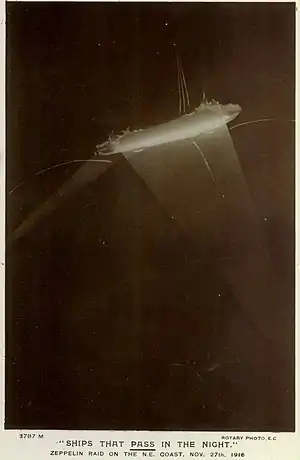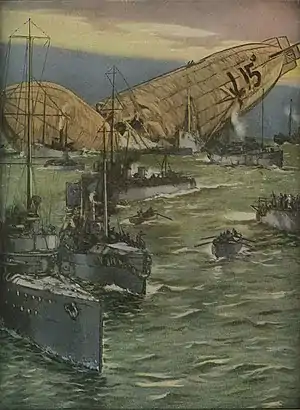| LZ 78 (L 34) | |
|---|---|
 | |
| Imperial German Army Zeppelin LZ 78 (L 34) over Hartlepool | |
| Role | R-class reconnaissance-bomber rigid airship |
| National origin | German Empire |
| Manufacturer | Luftschiffbau Zeppelin |
| Designer | Ludwig Dürr |
| First flight | 22 September 1916 |
| Retired | Shot down on 27 November 1916 |
| Primary user | Imperial German Army |
| Number built | 1 |
The Imperial German Army Zeppelin LZ 78 (L-34) was a R-class World War I zeppelin.
Operational history
The airship took part in three reconnaissance missions and two attacks on England dropping 3,890 kg (8,580 lb) of bombs. It also took part in the Zeppelin raid involving three other Imperial German Airships: the LZ 72 (L 31), L 32 and Zeppelin LZ 76 (L 33) on the evening of 23 September 1916. Of the four Airships, LZ 78 was the only Zeppelin that returned to base after the raid. Together all four Zepellins succeeded in dropping 3,200 kilograms (7,100 lb) of bombs on London and surrounding counties.
Last mission

On 27 November 1916, Zeppelin LZ 78 was intercepted and destroyed by British fighter pilot Second Lieutenant Ian Pyott in Royal Aircraft Factory B.E.2c (Serial no. 2738) off Hartlepool.[1] His bullets ignited the hydrogen, "like a massive fiery torch which lit up the night for miles around, she plunged into the sea."[2] The commander of the Airship was Kapitanleutnant Max Dietrich the uncle of famous actress Marlene Dietrich.[3]
Specifications (LZ 78 / Type R zeppelin)
Data from Zeppelin : rigid airships, 1893–1940[4]
General characteristics
- Crew: 17-19
- Capacity: 32,400 kg (71,430 lb) typical disposable load
- Length: 198 m (649 ft 7 in)
- Diameter: 23.9 m (78 ft 5 in) maximum
- Fineness ratio: 8.24
- Volume: 55,200 m3 (1,950,000 cu ft) in 19 gas cells
- Empty weight: 31,400 kg (69,225 lb)
- Gross weight: 32,908 kg (72,550 lb)
- Fuel capacity: 6,250 kg (13,779 lb)
- Useful lift: 63,800 kg (140,700 lb)
- Powerplant: 5 × Maybach HS Lu 6-cylinder water-cooled in-line piston engines, 180 kW (240 hp) each
- Propellers: 4-bladed Lorenzen fixed-pitch propellers
Performance
- Maximum speed: 103 km/h (64 mph, 56 kn)
- Cruise speed: 81 km/h (50 mph, 44 kn)
- Range: 7,400 km (4,600 mi, 4,000 nmi) at 81 km/h (50 mph; 44 kn)
- Service ceiling: 3,900 m (12,800 ft) static
- Rate of climb: 10 m/s (2,000 ft/min) maximum permitted (r-class)
Armament
- Guns: machine-guns in hull-top positions and gondolas
- Bombs: up to 60 bombs to a total of 5,000 kg (11,023 lb)
Dirigibles shot down over the UK
Airships made about 51 bombing raids on Britain during the war. These killed 557 and injured another 1,358 people. More than 5,000 bombs were dropped (largely on towns and cities) across Britain, causing £1.5 million (equivalent to £108,200,000 in 2021) in damage. 84 airships took part, of which 30 were shot down or lost in accidents.[5]
| Zeppelins shot down over the UK | |||||||||||||||||||||||||||||||||||||||||||||||||||||||||||||||||||||||||||||||||
|---|---|---|---|---|---|---|---|---|---|---|---|---|---|---|---|---|---|---|---|---|---|---|---|---|---|---|---|---|---|---|---|---|---|---|---|---|---|---|---|---|---|---|---|---|---|---|---|---|---|---|---|---|---|---|---|---|---|---|---|---|---|---|---|---|---|---|---|---|---|---|---|---|---|---|---|---|---|---|---|---|---|
|
See also
Bibliography
Notes
- ↑ Guttman 2018, p. 71.
- ↑ Jones 2016, p. 94.
- ↑ Marks 2017.
- ↑ Brooks, Peter W. (1992). Zeppelin : rigid airships, 1893–1940. Washington, D.C.: Smithsonian Institution Press. pp. 95-99. ISBN 1560982284.
- ↑ Liddell Hart 1934, p. 76.
References
- Guttman, Jon (2018). Zeppelin vs British Home Defence 1915–18. Bloomsbury Publishing. ISBN 9781472820341. - Total pages: 80
- Jones, Ian (2016). London: Bombed Blitzed and Blown Up: The British Capital Under Attack Since 1867. Frontline Books. ISBN 9781473878990. - Total pages: 512
- Liddell Hart, Sir Basil Henry (1934). A History of the World War 1914–1918. Faber. ISBN 978-0-304-93653-3.
- Marks, David (2017). Let the Zeppelins Come. Amberley Publishing Limited. ISBN 9781445667034. - Total pages: 96


.jpg.webp)

